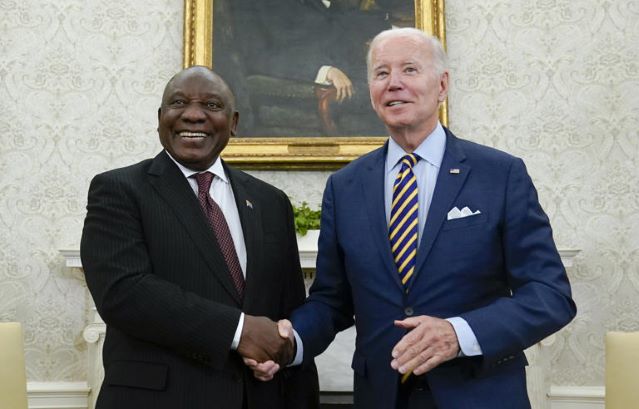SOURCE: The Washington Post
Biden scrambles to keep African nations in anti-Russian coalition© Alex Brandon/AP
Story by Yasmeen Abutaleb, Missy Ryan
With more than 40 African leaders visiting Washington this week, President Biden has a rare opportunity to court a group of nations that have been ambivalent about, and increasingly frustrated by, his global effort to rally support behind Ukraine and mount a unified front against Russia.
Biden this week will host the U.S.-Africa Leaders Summit, an event last held eight years ago under President Barack Obama. This time, the event comes as the White House is working, with mixed success so far, to coax support from African nations that have been hit especially hard by the consequences of the war in Ukraine, especially a wheat shortage and a disruption in the food supply but also rising fertilizer and fuel prices.
The African Union has condemned Russia’s aggression, but many nations on the continent have otherwise tried to remain neutral because they have long-standing ties with Russia as well as the United States and depend on aid from both, though the United States makes far greater investments. That has played out starkly at the United Nations, where many African countries have declined to vote in favor of U.S.-backed initiatives on Ukraine despite lobbying by the Biden administration.
African leaders have made clear to White House and administration officials that they simply want an end to the war, said a senior administration official familiar with the discussions, who spoke on the condition of anonymity to discuss internal conversations. The two sides disagree on what tactics to use to get to a settlement, the official said, as the Africans oppose the idea of punishing Russia or insisting that Kyiv must agree to any resolution.
African leaders have made clear to White House and administration officials that they simply want an end to the war, said a senior administration official familiar with the discussions, who spoke on the condition of anonymity to discuss internal conversations. The two sides disagree on what tactics to use to get to a settlement, the official said, as the Africans oppose the idea of punishing Russia or insisting that Kyiv must agree to any resolution.
“The Africans want to see a diplomatic solution to this conflict. We generally do, too, but ‘nothing about Ukraine without Ukraine,’” the official said. “The disconnect comes when some of the countries have expressed discomfort with sanctions and critiques of Russia that they think make it more difficult to get to a diplomatic solution.”
Rallying a broad global coalition behind Ukraine ranks among Biden’s top foreign policy achievements, especially now that many European countries are bracing for a cold winter and face a disruption of Russian oil and gas supplies. But African countries have persistently been among the holdouts, arguing that they suffer the some of the worst effects of the conflict and see little benefit in angering Russia.
Even before Russia’s invasion of Ukraine, there had been a slow-building food security crisis in many nations. The United States has long been the largest provider of food assistance globally.
Biden’s courtship of African leaders also unfolds amid a sharpening struggle between the United States and China for influence on the continent. Ahead of this week’s summit, the White House announced Biden’s support for having the African Union join the Group of 20 major world economies, a major step long pushed by African leaders.
Beyond that, the White House has sought to secure Africans’ patience with the anti-Russian effort — or at least prevent them from siding with Moscow — by providing aid for food and other priorities. The summit will include sessions on food security and agriculture, issues that African leaders are eager to discuss. The White House also announced Monday that the United States would commit $55 billion to Africa over the next three years in economic, health and security support.

